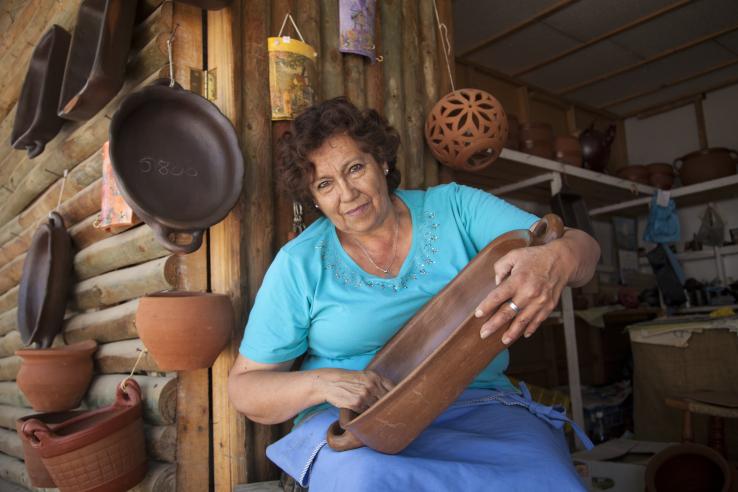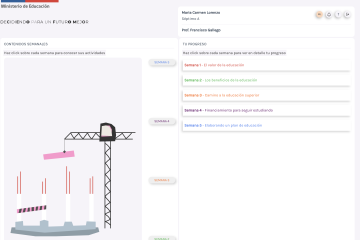
Improving access to microfinance in Chile: Lessons from a strong collaboration with Fondo Esperanza

This year marks the four-year anniversary of a close collaboration between Fondo Esperanza, the largest Chilean microfinance institution with twenty years of experience, and J-PAL affiliates Natalia Rigol, Benjamin Roth, and their research team. J-PAL Latin America and the Caribbean (LAC) has supported the implementation of the research since the start of this promising and enduring partnership.
Natalia and Benjamin recently published the first working paper resulting from this collaboration, which focuses on identifying and proposing a solution to why few borrowers “graduate” from rigid starter loans to more flexible loans over time.
Since 2018, the fruitful collaboration has included studies on the impacts of an emergency credit launched at the start of the Covid-19 lockdown; whether there are contagion effects to defaulting on credits; and the development of a new, personalized, and flexible credit instrument; as well as use of administrative data to dive more deeply into outstanding policy and program questions.
Experimenting to learn
In their first randomized evaluation with Fondo Esperanza, the J-PAL affiliates tried to understand the extent to which internal processes within a microfinance organization may hinder opportunities for clients to access better loan products.
When this evaluation began, Fondo Esperanza offered two main products: (1) a joint-liability loan; or (2) an individual-liability “graduation” loan. The first product consisted of lending small amounts of money to groups of borrowers. Each member was jointly liable for the other members' loans. The second product was a larger, individual loan. A borrower’s “graduation,” or the process of migrating from joint-liability loans to individual loans, depended on a loan officer’s recommendation.
The researchers suspected that the incentive structure for the officers might be affecting low loan “graduation” rates. Each loan officer received compensation based on the number of clients and the amount of risk in their portfolio. Some loan officers might be reluctant to recommend borrowers to graduate, because that would imply losing a good client from their portfolio as the client transitioned to a different loan officer. This meant that there were potentially suitable candidates for individual credit who were not graduating because of the negative incentives loan officers had for facilitating this process.
With this in mind, the team calculated the losses and gains that the institution could face based on differing incentives schemes for loan officers, and also tested a new incentive proposal. They found that changing the incentives increased the amount and, importantly, the quality of graduation recommendations, enabling more borrowers to access individual credit.
Evaluating new kinds of credit products
Adapting to new scenarios
During the Covid-19 lockdown, Fondo Esperanza proposed the team study the impacts of an emergency credit product launched in April 2020 to provide support to borrowers while payments and other credits were frozen. This evaluation is important, since there is little known about the impact of credits and other measures specifically designed for crisis situations. The results, which are forthcoming, could help researchers and practitioners understand the best way to support entrepreneurs during crises.
Proposing new solutions
The research team also proposed to evaluate a new flexible credit product, which Fondo Esperanza and the team are developing together. After completing a pilot, they are currently in the planning stages for a top-up credit product in which borrowers can customize the amount from a wide range of options, as well as choose their payment frequency, length of the credit cycle, and possibly grace periods.
Collaboration lessons
J-PAL LAC's role in this collaboration was largely in facilitating communication and engagement between the parties involved and in providing support for research implementation.
The team states that one of the most enriching aspects of this research collaboration is Fondo Esperanza’s eagerness to include the research team in their various questions on impact, and their openness to developing and testing new products and procedures. This innovative, open-minded approach to research and learning has been critical to the success of the partnership.
Their work has evolved to include multiple randomized evaluations, the development of new products and services, and the use of new administrative data that started being collected early in the pandemic. In addition, several rounds of qualitative interviews with many actors, such as borrowers and loan officers, generated learnings that led to improved intervention design and analyses.
These evaluations and their results have helped Fondo Esperanza learn about the impacts of their design and service decisions on microentrepreneurs and their businesses and households. This equipped them to make the changes necessary to make a positive social impact while maintaining a profitable and sustainable business model: focusing more resources on effective products, opening eligibility requirements as a result of improved screening, and offering more diverse products that better meet the needs of businesses.
The collaboration is also contributing to the academic literature, helping researchers better understand key questions about the microfinance sector. For example, the Covid-19 credit evaluation provides insights on suitable ways to support microentrepreneurs during crises.
This close collaboration and dedication between J-PAL affiliates and Fondo Esperanza highlight a shared belief in the power of scientific evidence to understand what really works in the fight against poverty. If you are interested in establishing a collaboration with J-PAL LAC, please contact us at [email protected].
Related Content

Evidence-informed strategies to support female microentrepreneurs in Latin America and the Caribbean

Impact of Covid-19 Stimulus Packages on Small and Medium Enterprises in Chile


